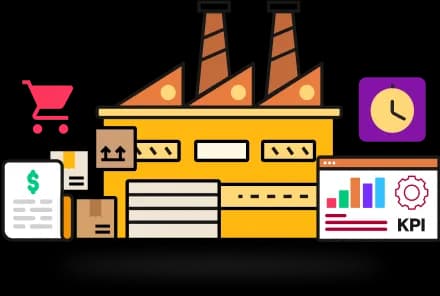Industry
Industrial Manufacturing
High Tech & Electronics
Footwear Manufacturing
Apparel & Textiles
Food & Beverage
Rubber & Plastics
Metal Fabrication
Industrial Machinery & Equipment
Construction & Engineering
Furnitures & Fixtures
Medical Device Manufacturing
Automotive Manufacturing
Aerospace And Defence
Screw Shop Manufacturing
Spring Shop Manufacturing
Solutions
Pricing
Resources
Company
GST Legacy
GST Impact on Small and Medium Business
The Goods and Services Tax (GST) has been heralded as the biggest indirect tax reform in India after Independence. After much deliberation, the GST bill has been passed in the Rajya Sabha and is set to be discussed in the state legislative assemblies in this winter session. With the ball set to roll for a unified country-wide tax reform, the market is filled with new found optimism amongst industry leaders and government officials. This sets the necessary momentum for the passage of the two Bills—Central GST (CGST) and Integrated GST (IGST) Bills—during the winter session along with the State GST Bill by different state assemblies. According to industry experts and government sources, the GST rollout date of April 1, 2017 is likely to be met. With this, enterprises, particularly SMEs, across a wide range of industries are caught in a state of flux. The comprehensive indirect tax GST will replace various other taxes such as Excise, Vat and Service Tax with a single tax structure. Driven by wide-ranging skepticism, several startups and SMEs are wary of the adverse impacts that may come into the picture with the GST rollout. According to various state governments the GST regime will benefit SMEs the most. As opined by industry experts, the much proclaimed benefits of eliminating the cascading effect of multiple central and state taxes and the ease of starting a business will impact them the most. However, market optimism aside, they are not very sure of the ways the new tax regime will affect their business and alter their bottom line. To comprehend the full repercussion of the tax reform, it becomes crucial to know the intricate aspects of GST and the associated tax reform in detail.
What is GST – Salient Features
GST is destination-based consumption tax levied at multiple stages of production and distribution of goods and services. It combines various other taxes such as state and local tax, entertainment tax, excise duty, surcharges, octroi and others. The tax is applicable on transaction value which includes packaging, commission and other expenses incurred during sales. It allows full tax credit from inputs and capital goods on procurement which can later be set off against the GST output liability.
A salient feature of GST would be that goods and services are considered alike and within the supply chain, they are taxed at a flat single rate till the customers can access them. The tax reform thus gives equal footing to large enterprises and SMEs and taxes the stock transfers uniformly.
Another salient feature of the GST rollout in India is that it will be dual based—that is, both center and various state governments will levy GST separately. The central government will levy CGST and the state governments will levy SGST respectively. However, the basis for classification of taxes, measure of levy and chargeability of taxes will be same for both. This is necessary keeping in mind the federal structure of the government, provided the governments at both levels have the liberty to administer their own taxes. In addition, GST will be levied on import of goods and services into India.
Another key feature of GST that needs mention is the elimination of the cascading effect of various state and central taxes. State taxes that will be subsumed within the GST are VAT, entertainment tax, entry tax, luxury tax, tax on betting and gambling. Various central taxes that will be subsumed are Central Excise Duty, Additional Excise Duty, Service tax, Additional Custom Duty, Special Additional Duty and Central Sales tax.
Positive Impact of GST on SMEs and Startups
As per industry experts, SMEs and startups will be affected the most with the rollout of the GST and the impact will be favorable in ways more than one. Some of the ways GST will benefit SMEs and startups are:
-
Ease of starting business: A business having operations across different state needs VAT registration. Different tax rules in different states only add to the complications and incur a high procedural fees. GST enables a centralized registration that will make starting a business easier and the consequent expansion an added advantage for SMEs.
-
Reduction of tax burden on new business: As per the current tax structure, businesses with a turnover of more than rupees 5 lakh need to pay a VAT registration fee. The government mulls the exemption limit under GST to twenty five lakh giving relief to over 60% of small dealers and traders.
-
Improved logistics and faster delivery of services: Under the GST bill, no entry tax will be charged for goods manufactured or sold in any part of India. As a result, delivery of goods at interstate points and toll check posts will be expedited. According to an estimate by CRISIL, the logistics cost for manufacturers of bulk goods will get reduced significantly—by about 20%. This is expected to boost ecommerce across the nation.
-
Elimination of distinction between goods and services: GST ensures that there is no ambiguity between goods and services. This will simplify various legal proceedings related to the packaged products. As a result, there will no longer be a distinction between the material and the service component, which will greatly reduce tax evasion.
Impact on Manufacturing Sector
According to Deskera, a leading cloud-based business management software provider catering to SMEs in South East Asia, the GST will enhance competitiveness of enterprises in the manufacturing sector by mainly mitigating the cascading effect of various taxes. Headquartered in Singapore, the company offers GST ready Enterprise Resource Planning software to global SME markets, with small and medium enterprises contributing over 70% of the company’s business across the world. A prominent provider of cloud ERP solutions, Deskera has been extensively working with various organizations in countries such as Singapore and Malaysia with their GST requirements. The company offers Deskera MRP, a fully GST compliant MRP solution in India to help manufacturers and traders to seamlessly migrate to the new regime once the GST law is implemented across the nation.
India is a global manufacturing hub and SMEs form around 90% of the industrial units in the country, according to IBEF. The ‘Make In India’ campaign promoted by the Indian government will get a boost with the rollout of the GST. Currently, excise duty on pre-packaged products for retail consumption is levied not on the transaction value at the ex-factory but on a fixed percentage of the maximum retail price (MRP) on the package. This leads to a higher MRP, which indicates a higher cost burden for the consumers. Under the GST regime, tax is paid by the manufacturers while purchasing raw materials for the products. The amount can be credited for subsequent resellers till the product reaches the final consumer. This will ease the tax burden significantly. Read Deskera becomes the first GST compliant cloud-based enterprise in India to know more about GST impact on manufacturing sector.
Challenges for SMEs
A sizeable portion of SMEs are of the opinion that GST is not all good for the sector and their fears may not be totally vacuous. The tax neutrality that the SMEs enjoy may be one of the prominent benefits. However, reduction in duty threshold is one of the key concerns that has led them to be wary of the GST bill. Under the existing excise tax, no duty is paid by a manufacturer having a turnover of less than rupees 1.50 crores. But, post GST implementation, the exemption limit will get significantly lowered. During a speech at a news conference, Finance Minister, Arun Jaitley estimate said, the limit can be as low as rupees 25 lakh. As a result, a large number of SMEs and startups will be mandated to come under the tax net and will have to pay a large chunk of their earnings towards tax. Furthermore, there are other flipsides to the proposed tax neutrality. GST regime won’t differentiate between luxury goods and normal goods; this will it hard for the SMEs to compete against large enterprises. GST that is ultimately levied on supply will not be available for input credit. This will lead to an increase in the cost of the products for businesses that supply directly to end users.
The Final Verdict
Unarguably, GST rollout will open up a can of worms and the impact on SMEs across various industries will vary greatly. It is quite natural for a pervasive, country-wide tax reform, as GST is, to have a mixed opinion. Furthermore, the revolutionary tax regime will have acceptance that will vary from state to state. Overall, the new tax proposals under GST will have a mixed verdict. In essence, the GST’s effect on the entire Indian economy will have to be scrutinized in totality to reach a widely accepted conclusion.
Get Started with Deskera
Benefits of cloud business software
- Productivity
- Implementation
- Mobility
- Scalability
- Security
See related articles about India GST
What our Customers Say About Us
Whatever your business
size, Deskera enables you to
simplify operations across
business functions. Here's
what our customers say
about us.


At GoDo, we understand that managing our finances and customer relationships is essential for our success. Deskera has provided us with an easy to use and intuitive platform that has enabled us to access our financial data, track customer relationships, and manage our finances with ease. We have been able to streamline our processes, better manage our finances, and stay on top of our customer relationships. We highly recommend Deskera to any business that is looking to stay organized and efficient.
Wesley Wright
CEO, GoDo Life


We are extremely pleased with our decision to switch to Deskera and have seen a significant improvement in our business operations since making the switch. The sales process was smooth from start to finish and customer support at every step of the implementation was stellar. Highly recommend Deskera to those looking for a great ERP solution.
Wally Mears
CEO, The Jungle

We implemented Deskera's integrated platform to improve our procurement and inventory management processes to streamline our operations and improve efficiencies. I highly recommend their platform to any company looking to accelerate their growth.
Scott Phetsalod
Laboratory Manager
Run Your Business With Deskera

Products
Use Cases
 , India
, India  , Singapore
, Singapore  , and Canada
, and Canada  with
with 


